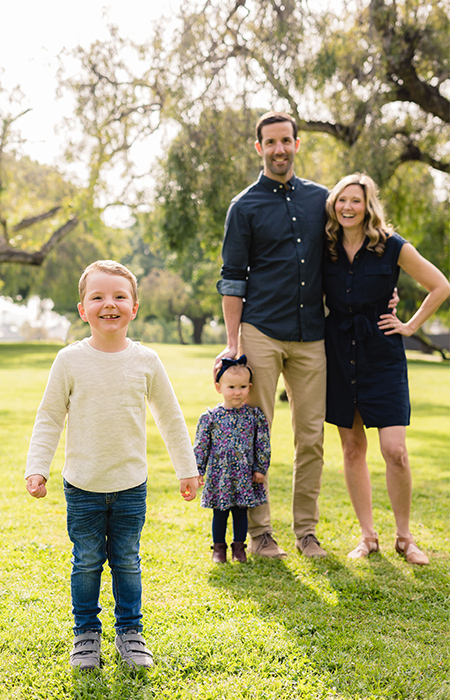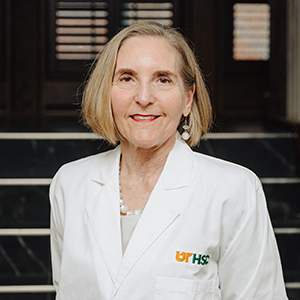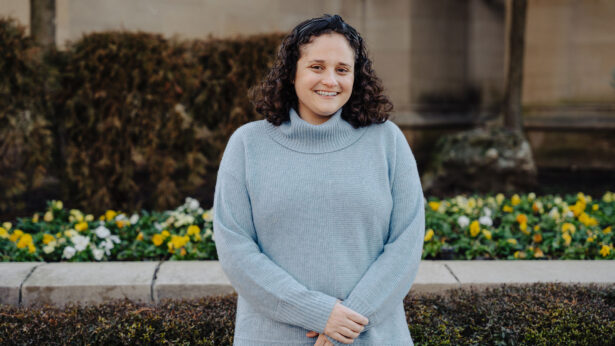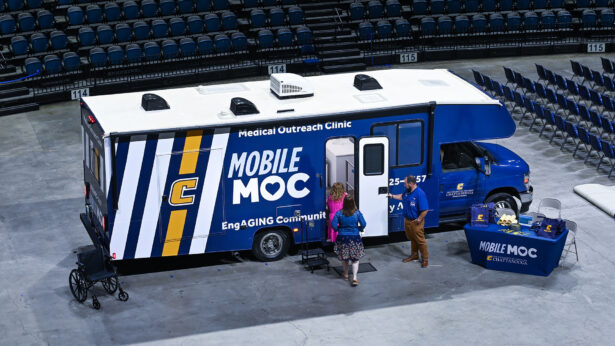
Four days after giving birth to her first child, Christina Kettler got a phone call that sent her to her knees.
Routine newborn screenings showed the seemingly healthy little boy she and her husband, Daniel, had named Fitz had severe combined immunodeficiency (SCID), a rare genetic disorder that results in a nonfunctioning immune system. The disorder leaves infants and children susceptible to all types of severe and potentially deadly infections. It is sometimes known as “bubble boy syndrome” after the 1970s movie about a boy with SCID who was forced to live in special isolation quarters to survive.
“I’ll never forget getting off the phone and just dropping to the floor and screaming, crying and being confused and so scared for this new little baby that we were responsible for,” Kettler said. “It was, if not the most terrifying day of my life, definitely up there.”
There were so many unanswered questions as the family rushed to an isolation unit in a California hospital near their home. But for Fitz, now a thriving 5-year-old, the frightening story has a happy ending, thanks to the power of modern medicine in the form of rapid whole genome sequencing (rWGS).
Whole genome sequencing organizes the entire DNA sample that makes up an individual human genetic dictionary into a file of letters that then can be examined for mutations that characterize certain diseases. Rapid testing generates results within 14 days from the date of receipt of the sample, with preliminary results as early as seven days.
Giving Other Kids a Chance
Across the country in Tennessee, Terri Finkel, M.D., Ph.D., is working to ensure infants and children born with lifethreatening genetic disorders, like Fitz’s and others, can have a chance for a happy ending, too.
Finkel is a tenured professor and the interim chair of the Department of Pediatrics at the University of Tennessee Health Science Center and pediatrician-in-chief at Le Bonheur Children’s Hospital in Memphis.
Earlier this year, she advocated before the Tennessee House and Senate for legislation to require TennCare coverage for rapid whole genome sequencing of newborns exhibiting signs of rare genetic diseases when certain criteria are met. This, she explained to the lawmakers, would give physicians the power to diagnose babies sooner and eliminate the pain, suffering and expense resulting from months and possibly years of testing to get a diagnosis.
The legislation passed unanimously and was signed into law May 28, making Tennessee one of 14 states to have laws for Medicaid coverage for rapid whole genome sequencing. In most of those states, rapid whole genome sequencing is an approved benefit only for infants. Tennessee is one of five states that have the benefit from birth to age 21.
“This is a life-changing event in Tennessee,” Finkel said. “This is a benefit that the citizens of Tennessee now have that will save the lives of many children over the years. It also affirms the importance of access to rapid whole genome sequencing, which delivers quick results for our sickest children, allowing physicians to begin treatments earlier.”
Navigating the Unknown
Fitz’s mom is a true believer.
“That night (after the phone call), we had to go directly to an isolation room at the hospital, and upon further discussions with the doctors, we learned there were multiple different types of SCID, and we had to know what type of SCID he had to get the proper care for him,” she said. “They told us about this thing called rapid whole genome sequencing, which could look at his entire genome and very quickly pinpoint exactly what type of SCID he had.”
The blood test that would provide the answer to Fitz’s future was done through Project Baby Bear funded by the state of California and led by Rady Children’s Institute for Genomic Medicine (RCIGM). A nonprofit research organization, RCIGM is a pioneer in rapid whole genome sequencing and has championed expanding its use in pediatric health care.
The family was learning everything as they lived it. They had never heard of rapid whole genome sequencing or SCID. “Just every single step, you’re just kind of a deer looking into headlights, not fully understanding the scope of everything, and you’re really leaning on the expertise and the care of the nurses and doctors and experts and everyone who’s coming in and talking to you about your baby,” Kettler said.
Faster Diagnosis Equals Faster Treatment
The results of the rapid whole genome sequencing showed Fitz had Artemis SCID, the rarest type of the disorder.
“Once we were able to have those results so quickly, the doctors started reaching out to their community and discovered there was a traditional route of a traditional bone marrow transplant. However, with this type of SCID, we were told most children don’t live past 1 year old,” she said. “We were told there was a clinical trial that had only been up and running for a year at the University of California, San Francisco.”
Treatment through the UCSF trial began when Fitz was 6 weeks old. “He had to go through two days of chemo,” Kettler said. “We had a procedure done to extract his bone marrow, where they then took that and essentially worked with that in the lab to correct his cell DNA that was incorrect. And then he had his gene therapy transplant.”
Expanding rWGS
The Kettlers were cared for by physicians in California; however, Finkel became familiar with their situation through ongoing collaboration with the RCIGM at Rady Children’s Hospital-San Diego. That’s where Fitz had the rapid whole genome sequencing that likely is the reason he is alive today.
A pediatric rheumatologist, Finkel chose her profession to help families navigate in the frightening and bewildering throes of diagnosis and treatment for their children.

“I decided to specialize in pediatrics because I love the relationship between adults and children,” she said. “There’s no tighter bond than between parents and their children, and it gets stressed with illness.”
Finkel joined the UT Health Science Center in 2020, after a decade as the chair of Pediatrics and chief scientific officer at Nemours Children’s Hospital in Orlando, Florida, and as a tenured professor of pediatrics and biomedical sciences at the University of Central Florida’s College of Medicine.
Finkel previously led the Division of Pediatric Rheumatology at National Jewish Health until 1999, when she was recruited as division chief of rheumatology at the Children’s Hospital of Philadelphia, Joseph Lee Hollander Endowed Chair of Pediatric Rheumatology, and a tenured professor of pediatrics at the University of Pennsylvania.
Her extensive history working with critically ill children and their families propelled her to advocate for better interventions for children who might otherwise languish in the process of diagnosis.
Those clinical experiences positioned her as the ideal advocate for legislation to help the smallest and most vulnerable citizens of Tennessee with one of the newer technological tools of precision medicine, rWGS.
“The rapid whole genome sequence allows us to know when there are variants in known genes, whether there are specific proteins that aren’t working in a child who has a critical illness,” she explained. “Early and rapid testing can translate to earlier and faster diagnosis and treatment.”
Becoming an Advocate
Armed with statistics from Rady and after becoming aware of the effort in Michigan to pass similar legislation to cover the cost of the genomic testing, “I began researching how I could make that happen in Tennessee,” she said. Similar efforts by others in Tennessee had stalled, primarily because of the estimated cost associated with rapid whole genomic sequencing.
Finkel connected with David Mills, director of government relations for the University of Tennessee Health Science Center, and together they sought to renew the effort.
State Rep. Brock Martin, R-Huntingdon, and state Sen. Richard Briggs, R-Knoxville, were the sponsors of the legislation, House Bill 1826 and Senate Bill 1762.
“They asked me to write a justification based on what we knew from three other big studies, the one in California, the one in Michigan and one in Florida, which had all passed this bill,” she said. “Based on those studies, it showed that not only was this test cost effective, but it saved and generated money.”
“In other words, the cost of the test, and it’s not a cheap test, is offset by the fact that you have children in the hospital fewer days, and they need fewer expensive, painful, prolonged testing,” she explained. “And so, aside from the actual cost saving, there’s the saving of worry and lost work time and suffering of both families and the children.”
Finkel wrote letters summarizing the cost data, underscoring the message that the legislation would save lives without excessive costs to the state. She was invited to address the House and the Senate in her capacity as a physician who cares for infants and children who could benefit from the testing.
Invaluable support came from UT Health Science Center, Le Bonheur, the UT System, the Children’s Hospital Association of Tennessee, St. Jude Children’s Research Hospital and Vanderbilt.
There are criteria that would make a child eligible for the testing, such as presenting with an acute or complex illness of unknown cause, abnormal laboratory tests or chemistry profiles suggesting a genetic disease, or birth defects involving at least two organ systems. However, there is room for physicians to apply their medical judgment. “The law also applies if the child is not responding to treatment as we anticipate, which makes it user friendly in the sense that we can use our judgment as physicians as to which children are most likely to benefit from this test,” Finkel said.
Most often, this testing would apply to critically ill children in the neonatal intensive care and pediatric intensive care units.
“This is the most impactful bill that I’ve been blessed to sponsor,” Martin said. “Not many bills are wins for all parties involved, but this one does just that. It will allow families to get answers faster, doctors to know what treatment is needed quicker, the taxpayer funds to be used more wisely, and finally help get these sweet babies on the road to better health more rapidly. It’s simply good health care policy and the right thing to do.”
The law went into effect in Tennessee July 1. TennCare and most of the other managed care organizations have put policies in place to allow the test to be ordered if it is indicated by a patient’s condition, Finkel said. “My physician colleagues and I will be working together with our hospitals to bring this life-saving test to our children and families.” Pointing to a milestone in this process, she said, the first rapid whole genome sequencing test was ordered for a critically ill baby at Le Bonheur in late October.
“This was one of the most remarkable things I’ve ever been involved in,” Finkel said.
Finding Path Forward
Christine Kettler will second that sentiment.
Fitz had the gene therapy at UCSF on August 29, 2019. “That’s his life day,” she said. “It’s kind of your second birthday, the day that we were given life.” After the gene therapy, the family had to wait in the hospital for three months for his immune system to develop.
“And sure enough, after three months, it did,” she said. “He has done beautifully. He was able to discontinue any medication he was on. He’s fully vaccinated. He’s basically living like a normal 5-year-old boy.” The family now lives in Canada, and Fitz will be followed in the UCSF study periodically until age 15.
Kettler wants people to know her son’s story.
“Our story is powerful, and I hope it reaches parents who may feel as lost as we once did,” she said. “We were so fortunate to have a happy ending, and I want others to know that a path forward might be possible for them, too.”



